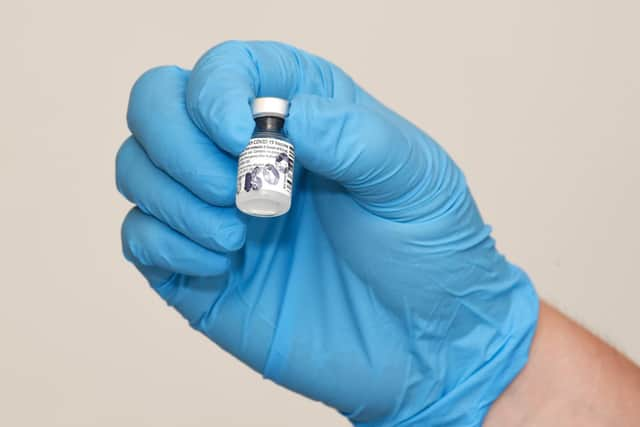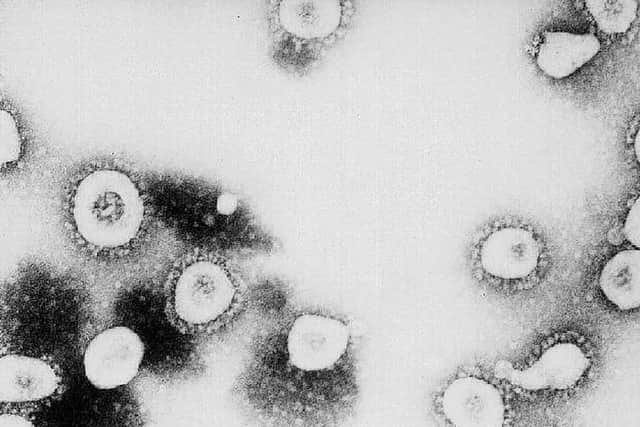Banbury's questions about Covid vaccinations - part two with Dr Helen Salisbury


Dr Helen Salisbury, MA MBBS 1991 MRCP MRCGP, is a GP at Jericho Health Centre, Oxford and was one of the participants in the Oxford-AstraZenica vaccine trials. She teaches on the Communication Skills course for medical students in Oxford and is a columnist on the British Medical Journal. She Tweets at @HelenRSalisbury.
Q. Why is the black, Asian and minority ethnic (BAME) community at greater risk of Covid-19 and should they be taking Vitamin D?
Advertisement
Hide AdAdvertisement
Hide AdA. The whole question about why people from BAME groups have worse Covid, that can't be accounted for by previous conditions or more exposure to Covid because of their job, is still really unsolved. If you look at who has died in terms of medical and nursing staff, huge numbers are black or Asian. There's probably something going on there that is above economic deprivation, because, why should they be more deprived than their (non-BAME) colleagues?


There's been suggestion that one reason people are getting worse Covid is low Vitamin D levels but no one has actually proved that. It's very unclear what the relationship is between bad Covid and vitamin D deficiency. Vitamin D deficiency is common in this country because it's made from sunlight through the skin and we don't have enough sunlight, and it is particularly common in people with darker skins who make less of it. The advice is that we should all, whatever the colour of our skin, be taking vitamin D supplements through the winter. And that's probably more important if your skin is dark. You can get Vitamin D really really cheaply in the pharmacy.
Q. Will we need yearly boosters for now on?
A. We need boosters if there are mutations and there are mutation if there's lots of circulating virus. It might end up like flu which is something there's lots of around the world all the time, and then the new strain arrives and we need to have a booster against that particular new strain of flu. And it's quite likely that Covid might become like that. It will be interesting to see if they can actually combine those two (vaccinations) which is a possibility.
Once you've got your basics done you can tinker and make a new 'template' (for the same vaccine) quite quickly and make a subtly different variation.
Advertisement
Hide AdAdvertisement
Hide Ad

Q. Will we have to have a huge, rolling vaccination programme every year?
A. It's possible. If you think about flu vaccines, every year GPs offer a flu vaccination to everyone over 65 and everyone with conditions that make them more vulnerable. We haven't done that yet for the Covid vaccine. We normally just get on and do that. It's easier with flu as the vaccines come in a single pre-packed dose; you see someone (in surgery) for something else and you give them their flu dose with pre-filled syringes - and you can see it getting as efficient as that. If that's what we need to do eventually, it's not going to be difficult to do. I would suggest it's done through GPs as everyone is registered with a GP; we do our flu clinics on Saturdays in October.
Q. When will early years workers and paramedics get their vaccinations?
A. I would have thought paramedics should already have had it because they are particularly vulnerable. They should have had it with the other health workers. Most health workers are having it through their employers but if people have missed it they can go to their GP. Early years - we're still waiting to hear from government about what's happening with teachers generally and I think early years comes into that category. We know that most children don't get ill with it but there is still conflicting evidence about how much it's passed on by children, much more by teenagers than by little ones.


Q. Does the vaccine affect any other health conditions?
Advertisement
Hide AdAdvertisement
Hide AdA. I think the answer is no. The vaccine is very specific; it's a specific instruction to your body to fight this virus if you meet it again. And it really doesn't do anything to the rest of you. So it won't protect you against anything else and it's not going to make your asthma worse or affect your diabetes in any way or do anything else to you apart from help you fight coronavirus.
Q. Are particular vaccines being directed to places where 'high' strains are known to be circulating?
A. I think down the line when we've got better evidence about different efficacy (of the different vaccines) against different strains it may well be that they redirect certain vaccines to certain places but at the moment we don't know for sure where the different strains of the virus are and at the moment we are just using all the vaccines we can get our hands on.
Q When will there be boosters to cover the new variants?
A. I don't think we do know when new vaccines will be available. One of the things that we need to do is get as many people vaccinated as possible to reduce the amount of circulating virus. The virus mutates when lots of people have it. So the more people have it, the more likely you are to have new mutations. And the thing we really, really need to do is stop transmission to stop new mutations. If we discover that people are getting infected with a strain despite having had a vaccine then we're going to have to come up with a new one really quickly.
Advertisement
Hide AdAdvertisement
Hide AdQ. People having one of the vaccines are having to wait 15 minutes before leaving the vaccination centre, the others aren't. Why?
A. This all to do with allergic reaction. With the Pfizer vaccine they were concerned about the possibility of allergic reactions so they suggested a 15-minute observation period. And initially that was withdrawn because it does make the vaccine-giving much more difficult to set up. But then a couple of people who were known to have severe allergic reactions anyway, did have allergic reactions. So they put back that 15 minutes observation. It's a really interesting question in my mind. Are you safer sitting in your mask two metres apart from lots of other people, having had your vaccine. Are you more risk of catching Covid in that situation? Are you more risk of having an anaphylactic reaction if you leave the room straight away. It's a question of balancing risks and benefits.
With the Oxford AstraZeneca vaccine, as far as I know we haven't heard any reports of anaphylaxis but people are still advised not to drive for quarter of an hour after they have the vaccine.
Q. Is it worth delaying vaccines for people who've recently had Covid-19, because they are thought that to have a level of immunity anyway?
Advertisement
Hide AdAdvertisement
Hide AdA. The current advice is you should wait four weeks after Covid before you have your vaccine. The suggestion is the vaccine will boost whatever natural immunity you've got.
Q. Why aren't people with asthma in Group 6 for vaccination?
A. My understanding is that anyone on the register to get a flu vaccine, that is anyone with asthma who needs to use a regular steroid inhaler, does get priority for the vaccine.
Q. A reader with a rare neurological condition following flu was told never to have the flu jab, as it could trigger the condition. Should they avoid the Covid jab?.
Advertisement
Hide AdAdvertisement
Hide AdA. Really interesting question. I think they should talk to their neurologist. They have a very rare autoimmune condition that can be sparked by viral infections. I would have thought that they would be more at risk from Covid than from the Covid jab but I would definitely suggest talking to their neurologist. Anyone who have got unusual conditions should check with their specialists and the answer will nearly always be 'have the vaccine'.
Q. I have been through chemotherapy and radiation and am now on tablets. Will the Covid vaccine cause any bad response?
A. No. There is absolutely no reason why it should.
Some vaccines are what are called live vaccines. And therefore, if your immune system isn't working terribly well, you'd be best advised not to take them just in case you get infections from the vaccine. Most people wouldn't at all. With this vaccine, none of the versions of the vaccine are live. There's nothing that can be produced or can make you have coronavirus in the vaccine. Because only tiny little bits of the protein that are on the outside of the virus is given to you, showing it to the immune system so it can recognise it again. None of that can cause you any harm. The worst that might happen if your immune system is not brilliant is that you won't develop the immunity to coronavirus that we would hope you would get. It can't do you any harm or cause an infection.
Q. Is there any chance that this will mutate and be with us for years?
Advertisement
Hide AdAdvertisement
Hide AdA. The likelihood of that happening is greater the more cases there are out there. So we've just got to unfortunately, keep lockdown til we've got rid of it, keep testing and tracing and isolating and making sure that we stamp it out every time the virus shows in its head again, vaccinate as many people as we can to limit the spread, so we can get like New Zealand where they don't have any.
Q. So people need to be altruistic and have the vaccine for the sake of everybody?
A. Absolutely. Because, even with the total best case scenario, the vaccine's 95 per cent effective, which would mean that even if you're fully vaccinated, you've still got a one in 20 chance of getting it, probably less severely. It's not that having the vaccine will definitely stop you having Covid - it probably will - but can't we can't say that 100 per cent. However, if nearly everyone has the vaccine then the virus has got nowhere to go. It'll fizzle out and we'll get rid of it. That's what we're aiming for.
I know herd immunity sounds like a dirty word considering what happened at the beginning of this pandemic. But herd immunity - that means everybody being immune so the virus has got nowhere to go - comes from a vaccination and that is really what we're looking for. That's what we've got with polio, for example; there aren't many people with susceptibility to polio so there's no polio virus around. That's where we want to be with with coronavirus, that's where we are, in most cases with measles, though unfortunately some of that's coming back because vaccination levels have fallen. So we need to have people being immune to it, so the virus then fizzles out.
Advertisement
Hide AdAdvertisement
Hide AdQ. A woman reports that she had the Oxford vaccine and was very poorly for four days. Is she going to be poorly with the second vaccination?
A. I don't know, is the honest answer. It's quite likely that she will be poorly after the second shot. I'm really sorry, it sounds like she has quite a big reaction to the vaccine. The only thing I can say is it shows that her body is really recognising something so it should be providing a good protection.
Q. Is it okay for people with long-Covid to be vaccinated, even with food intolerances?
A. As far as we know it's fine for people with long-Covid to be vaccinated. I haven't heard of anyone specifically saying it causes more problems for people with with long-Covid. Long-Covid is probably quite a mixed bag of things anyway, probably not one single entity, and I don't think the food intolerances have any bearing on it, simply because the vaccine doesn't have any food elements in.
Advertisement
Hide AdAdvertisement
Hide AdFollowing our interview, Dr Salisbury said she understands that some people are unsure and uncertain. "It's something new and it's not surprising that people are unsure and uncertain and uneasy, because everyone's unsure at the moment and people need lots of reassurance - and that is fine," she said.
"We've been vaccinating since middle of December and none of our patients have needed medical attention, having had the vaccine. They've all done fine, although some have had sore arms. I've also been very relieved that the oldest in some of the families I look after, where there are several generations in the same house, had their vaccinations in December and have stayed well while unfortunately others in the family have been quite ill with coronavirus.
"It's been really gratifying for me to feel that actually these people were protected. And I would strongly encourage everyone to get a vaccine, as soon as they can. And there may be points for one vaccine over another but they're probably minor compared to the advantage of just getting a vaccine as soon as you're offered it - to protect you and to protect the people around you," she said.
Part one of our interview can be found here.